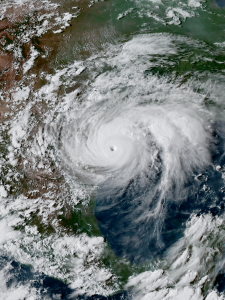May 8, 2024
AGU Celebrates Bipartisan Approval of Weather Act Reauthorization
Posted by Caitlin Bergstrom
AGU, the world’s largest Earth and space science association, applauds the bipartisan effort by Congress to pass The Weather Act Reauthorization, H.R. 6093, which promises to make weather forecasting in the U.S. more accurate.
AGU endorsed H.R. 6093 in November along with several other pieces of legislation that were added to this bill, including the National Weather Service Communications Improvement Act, H.R.1496; NOAA Weather Radio Modernization Act, H.R.1482; and Tsunami Warning, Research, and Education Act Reauthorization Act, H.R.6234.
“We are excited to see H.R. 6093 build on the successes of the original Weather Act, which significantly advanced weather forecasting,” said Lisa J. Graumlich, President of AGU. “As communities become increasingly affected by severe weather events like wildfires and storms, it’s crucial to maintain robust forecasting capabilities nationwide. This legislation underscores our commitment to advancing weather science to better protect all communities, especially those most vulnerable to severe weather.”
Graulich further emphasized the significance of bipartisan collaboration in advancing science and public safety. “As an organization dedicated to ensuring that science is not only usable but used, we are encouraged to see Congress’ bipartisan efforts to ensure the nation is positioned to address emerging and occurring weather and climate impacts. This legislation represents a crucial step forward in fortifying our nation’s weather forecasting capabilities and ensuring the resilience of communities across the country.”
The Weather Act Reauthorization represents the first major reauthorization of weather programs at the National Oceanic and Atmospheric Administration (NOAA) since 2017.
Among its key provisions, the bill:
- Improves severe weather forecasting by modernizing critical research programs authorized by the 2017 Weather Act, including tornado warning capabilities and hurricane forecasting capacity;
- Supports cutting-edge forecasting by establishing new research and development programs related to the next generation of radar, atmospheric rivers, coastal flooding & storm surges, aviation weather and more;
- Strengthens emergency preparedness by enhancing the communication of weather and water events to the public, from critical warnings to emergency information.
AGU recognizes that certain elements of the bill will require further action, including the need to provide the actual funding that the bill authorizes, as well as to ensure that provisions for research security do not place an undue burden on international students and academic institutions.
AGU urges Congress to act on the funding framework created by this legislation by providing the actual appropriation of the money envisioned.


